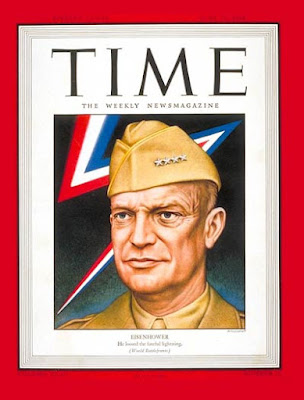V-MAIL
438th AAA AW BN
APO 403 % Postmaster, N.Y.
France
7 July, 1944
Hello darling!
Well last night, believe it or not, I saw a movie – right out in a field – but under an apple tree. The screen was rigged up in such a way as not to show any light. Unfortunately the picture was terrible – Gloria Jean in “Moonlight in Vermont” – if you can imagine such a thing. But you’ve got to give our Special Service Officer credit for arranging it. The relaxation was wonderful for 1½ hours.
This might have been the field and apple
tree where the movie was shown.
CLICK ON IMAGES TO ENLARGE

July 1944 - Normandy - South of Carentan
tree where the movie was shown.
CLICK ON IMAGES TO ENLARGE

July 1944 - Normandy - South of Carentan
No mail yesterday, Sweetheart – but there should be some today, I hope. Everything has been going along well and I’m not complaining. There seems to be a certain optimism around these parts that the Jerries can’t possibly fight very long. The power we have is terrific and even the fanatical Hitler-Jugend that are being captured – say they never faced anything so terrible.
All for now, dear. Love to the folks and
All my love
Greg
* TIDBIT *
about Hitler-Jugend
CLICK ON PICTURES TO ENLARGE

Hitler Youth Recruitment Poster
"Youth Serves the Leader"
"All 10 Year Olds into the Hitler Youth"
about Hitler-Jugend
CLICK ON PICTURES TO ENLARGE

Hitler Youth Recruitment Poster
"Youth Serves the Leader"
"All 10 Year Olds into the Hitler Youth"
The Hitler-Jugend (HJ) (Hitler Youth) was a paramilitary organization of the Nazi Party which existed from 1922 to 1945. It was made up of the Hitlerjugend proper, for male youths ages 14–18; the younger boys' section Deutsches Jungvolk for ages 10–14; and the Bund Deutscher Mädel for girls. The HJ were viewed as future "Aryan Supermen" and were indoctrinated in anti-Semitism. One aim was to instill the motivation that would enable HJ members, as soldiers, to fight faithfully for the Third Reich. The HJ put more emphasis on physical and military training than on academic study. Many HJ activities closely resembled military training, with weapons training, assault course circuits and basic tactics. Some cruelty by the older boys toward the younger ones was tolerated and even encouraged, since it was believed this would weed out the unfit and harden the rest. By December 1936, HJ membership stood at just over five million. That same month, HJ membership became mandatory for Aryans, under the Gesetz über die Hitlerjugend law. This legal obligation was re-affirmed in 1939 when membership was required even if it was opposed by a child's parents. By 1940, it had eight million members.
In 1943, Nazi leaders began turning the Hitler Youth into a military reserve to increase manpower which had been depleted due to tremendous military losses. In February 1943, the 12th SS Panzer (armored) Division Hitlerjugend, under the command of SS (Protective Squadron) Brigadeführer (Major General) Fritz Witt, was formed. The Division was a fully equipped Waffen-(Armed)-SS Panzer division, with the majority of the enlisted force being drawn from Hitler Youth boys between the ages of 16 and 18. By 1 September 1943, over 16,000 recruits had completed their six-week basic training. Many of the recruits were so young that they were supplied with sweets instead of the standard tobacco and alcohol ration.
The Hitlerjugend Division was unique because the majority of its junior enlisted men were drawn from members of the long-indoctrinated Hitler Youth, while the senior NCOs and officers were generally experienced veterans of the Eastern Front. The division, with 20,540 personnel, first saw action on 7 June 1944 when deployed against the British and Canadian forces to the north of Caen. During the following months, the division earned itself a reputation for ferocity and fanaticism.
In 1943, Nazi leaders began turning the Hitler Youth into a military reserve to increase manpower which had been depleted due to tremendous military losses. In February 1943, the 12th SS Panzer (armored) Division Hitlerjugend, under the command of SS (Protective Squadron) Brigadeführer (Major General) Fritz Witt, was formed. The Division was a fully equipped Waffen-(Armed)-SS Panzer division, with the majority of the enlisted force being drawn from Hitler Youth boys between the ages of 16 and 18. By 1 September 1943, over 16,000 recruits had completed their six-week basic training. Many of the recruits were so young that they were supplied with sweets instead of the standard tobacco and alcohol ration.
The Hitlerjugend Division was unique because the majority of its junior enlisted men were drawn from members of the long-indoctrinated Hitler Youth, while the senior NCOs and officers were generally experienced veterans of the Eastern Front. The division, with 20,540 personnel, first saw action on 7 June 1944 when deployed against the British and Canadian forces to the north of Caen. During the following months, the division earned itself a reputation for ferocity and fanaticism.















